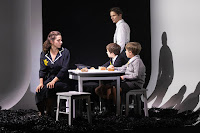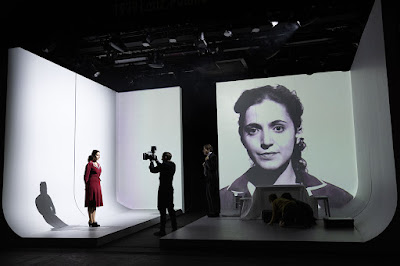The White Factory
by Dmitry Glukhovsky
director Maxim Didenko
with Mark Quartley, Pearl Chanda, Adrian Schiller, James Garnon, Matthew Spencer, Olivia Bernstone, Lewis Hart, Rachel Barry, Cameron McColm, Lucas Allermann, Paul-Hector Antoine, Leo Franky, Aron Yacobi
sets & costumes Galya Solodovnikova • music Louis Lebee
lighting Alex Musgrave • sound Julian Starr
Marylebone Theatre • 14.Sep-4.Nov.23Jewish-Polish playwright Dmitry Glukhovsky finds chilling present-day resonance in this account of the Łódź ghetto during World War II, during which Jewish community leaders negotiated with Nazis for the least horrific outcome, ignoring larger issues beyond their borders. Staged in a bracingly visual way by director Maxim Didenko and designer Galya Solodovnikova, this is a frightening exploration of the insidious creep of totalitarianism and fascism.
In 1939 Łódź, Jewish atheists Yosef and Rivka Kaufman (Quartley and Chanda) live with their two young sons and Rivka's disabled father (Schiller), and none of them take the rising tide of Polish racism seriously. Even when Nazis turn up and force Jews into a ghetto, they expect the best. Orphanage director Chaim Rumkowski (also Schiller) is appointed leader, setting out to make the Jews indispensable through manufacturing, turning the Catholic church into a "white factory" making pillows. But Nazi boss Koppe (Garnon) is creating a death machine, demanding that Rumkowski hand over Jews for deportation. In 1942, he is ordered to send 20,000 children and elderly, and he begs the ghetto to cooperate to save as many lives as possible.
These events are bookended by scenes in 1960 as Koppe is arrested and put on trial in Brooklyn over 340,000 people who died under his orders. But he points the blame at Yosef, who says he was following orders as a ghetto police officer. Of course, Wilhelm also plays the victim, claiming to have merely followed orders himself. The fine performances bring out nuances in each character with often shocking resonance. Quartley's role is particularly demanding, with full physicality and intense emotions that are lightened by his chemistry with Chanda, who plays both Rivka and his unknowing new American wife.All of this may be very familiar, often dramatised on stage and screen. But it's given a new slant with clever touches that fill the abstract stage, which is cube-shaped like a TV screen. Onto this, live video is projected documenting scenes period style with striking closeups, plus some lively storytelling sequences with eye-catching special effects (although an audio delay makes this awkward to watch). The earthy, naturalistic acting adds a beautiful counterpoint, as does the way this cube splinters and shifts, dirtied with blood and ash.
Yes, this is a grim, violent story that's powerfully moving and often gruelling to watch. The writing is talky, and the muffled sound makes it difficult to follow so many characters with inaudible names. But the issues are razor-sharp, taking on inaction, collaboration, compromise, resistance and even suicide. The Nazis maintain a false sense of hope within the ghetto, encouraging belief in a positive future while also dealing in fear, threats and manipulation. All of this is horrifically familiar in the world today. And the question of whether it's possible to achieve either justice or peace echoes loudly.“Wherever human beings endure suffering and humiliation, we must always take sides. Neutrality helps the oppressor, never the victim. Silence encourages the tormentor, never the tormented.” —Elie Wiesel







No comments:
Post a Comment